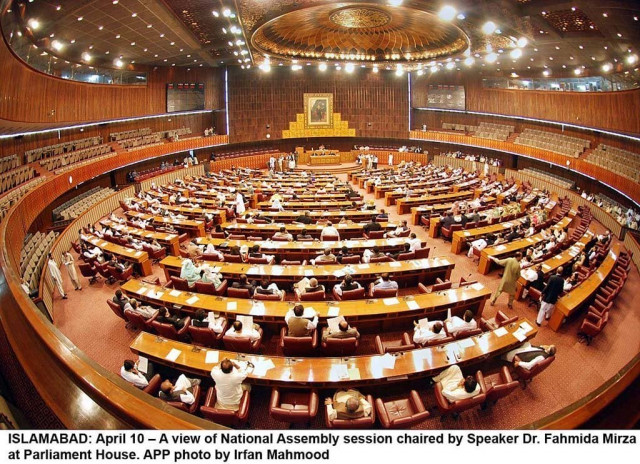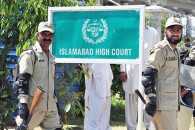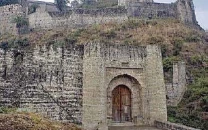Even 17 to 20 grades officers made way to BISP benefits, NA told
Minister says all brick kilns in Islamabad will be converted to zigzag technology

National Assembly of Pakistan. PHOTO: APP
Communications Minister Murad Saeed told the House that suspicious BISP profiles were removed after a detailed meeting of the federal cabinet. “In Sindh, even government officers working in grades 17, 18, 19 and 20 were enrolled in the income support programme,” he said.
Taking the floor, Parliamentary Affairs Minister Ali Muhammad Khan hailed the BISP as “a great initiative for social welfare” but added that some of its beneficiaries happened to be the ones who had cars and even travelled abroad. “The BISP has 800,000 deserving people,” he said.
Former minister Raja Pervez Ashraf commented over the expulsion of 830,000 people from the BISP, saying that that the government must provide solid grounds and detailed information of the suspicious beneficiaries before taking such a measure.
Earlier, the lawmakers objected to the absence of ministers during the ‘Question Hour’, leading to the presiding officer, Syed Fakhar Imam, to take a 15-minute break. After the break, Agha Rafiullah of the PPP again pointed to the absence of some of the ministers.
Education Minister Shafqat Mehmood, while responding to a question, announced that the government would launch a training programme from Thursday (today) for the faculty members and researchers employed by universities.
National Assembly green-lights key military-related bills
“A special module of the training programme is being started,” he said, adding that the programme would provide training to thousands of students every year. “The students from Balochistan will be given priority in the training package,” he added.
“The government is committed to ensure better quality and opportunities in the higher education sector as per international standards. In 2020, we will train 170,000 youngsters, with special preference to the youth of Balochistan.”
Climate Change Minister Zartaj Gul, while responding to another question pertaining to brick kilns in Islamabad, said that the federal capital was reeling under smog. “Due to depleting environment, we have converted six of the 64 brick kilns to the zigzag technology.”
She added that the kilns had remained without any regulation so far but now the federal cabinet had approved a policy for upgrading of all brick kilns to zigzag technology, which is environmentally friendly.
“The technology is introduced with the cooperation of the All Pakistan Brick Kiln Owners Association. All the owners of brick kilns who have not yet submitted affidavits to convert their kilns to environment-friendly technology have been directed to convert them by the end of 2020,” she said.
“All the six operational steel furnaces in Islamabad have installed the pollution abatement technology, which has been monitored by Pak-EPA in the last four months through routine visits of environmental monitoring teams and online surveillance cameras for stack emissions,” she added.



















COMMENTS
Comments are moderated and generally will be posted if they are on-topic and not abusive.
For more information, please see our Comments FAQ